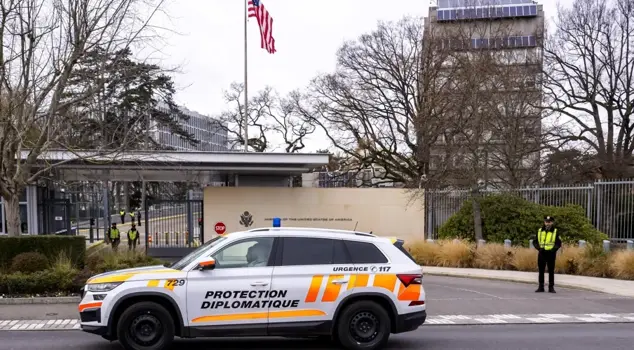
23.11.2025 17:13
Ukraine has accelerated its diplomatic efforts following the United States' 28-point peace plan. Peace talks began in Geneva, Switzerland, with the participation of representatives from the U.S., Ukraine, and Europe. The meetings are being held behind closed doors at the Intercontinental Hotel.
The Office of the President of Ukraine announced that discussions between delegations from the United States, Ukraine, and Europe have begun in Geneva, Switzerland, following the 28-point peace plan presented by the U.S.
Discussions regarding the 28-point peace plan proposed by the U.S. government to end the war in Ukraine are ongoing. The meeting concerning the peace plan began in Geneva, Switzerland, among American, Ukrainian, and European delegations.
Attending the meeting were U.S. Secretary of State Marco Rubio, U.S. Special Representative for the Middle East Steve Witkoff, Head of the Office of the President of Ukraine Andriy Yermak, Secretary of the National Security and Defense Council of Ukraine Rustem Umerov, and officials from the United Kingdom, France, and Germany.
INITIAL CONTACTS BEHIND CLOSED DOORS
Yermak, who announced the start of the discussions, stated that the Ukrainian delegation first met with European security advisors in closed-door meetings held at the Intercontinental Hotel. Andriy Yermak revealed that advisors from the UK, France, and Germany participated in the meeting. Indicating that the next meeting would be with the U.S. delegation, Yermak said, "We are making quite constructive progress. Overall, a series of meetings in various formats are planned for today. We continue to work towards establishing a lasting and fair peace for Ukraine. It should be noted that these discussions are taking place behind closed doors, and we will inform you as soon as we obtain the latest developments."
A MESSAGE FROM ZELENSKY
Ukrainian President Vladimir Zelensky also released a statement on social media, saying, "Teams working on steps to end the war are currently gathering in Switzerland. The revival of diplomacy and the potential for constructive discussions is a good thing. The delegations from Ukraine and the U.S. are in close contact with our partners in Europe, and I hope for a result. The bloodshed must stop, and the war must never reignite. I am waiting for the results of today's discussions and hope that all parties will be constructive. We all need a positive outcome."
RUSSIAN CLAIM BY U.S. SENATOR
U.S. Republican Senator Mike Rounds claimed that U.S. Secretary of State Marco Rubio told them that the 28-point plan for peace in Ukraine was not an American proposal, but represented Russia's position and was presented to U.S. Special Representative Witkoff by an official representing Moscow. In a statement made at the Halifax Security Forum on Saturday, Republican Senator Mike Rounds said, "What Rubio told us is that this plan is not an American proposal."
Rounds emphasized that the plan was presented to Witkoff by a Russian representative, stating, "This is not the solution we are recommending. This is not our peace plan."
"THE PLAN WAS DRAFTED BY THE U.S."
U.S. Secretary of State Rubio, denying Rounds' statement, said, "The peace proposal has been drafted by the U.S. It is presented as a strong framework for ongoing negotiations. While the proposal is based on consultations with the Russian side, it is also based on prior and ongoing consultations with Ukraine."
OBJECTIONS FROM EUROPE
After President Donald Trump suggested that Ukraine should cede some of the territories it currently controls and limit troop numbers, putting Ukraine under significant pressure, the details of the 28-point plan proposed by the U.S. were revealed for the first time. Ukrainian President Zelensky stated that his country was facing one of the most challenging moments in its history, while Russian President Vladimir Putin said the proposal could "form a basis for an agreement." Ukraine's allies openly opposed the plan, issuing a joint statement expressing that "the plan would leave Ukraine vulnerable to attacks." A joint statement signed by Canada, Finland, France, Ireland, Italy, Japan, the Netherlands, Spain, the UK, Germany, Norway, and two senior EU officials raised concerns about the limitations to be imposed on the Ukrainian army and border changes. Following the objections from Ukraine's European allies, Trump backtracked on his statements that "Zelensky would have to accept the plan," and in a statement made on Saturday, he said the proposal was not final.